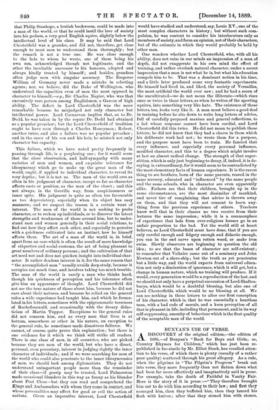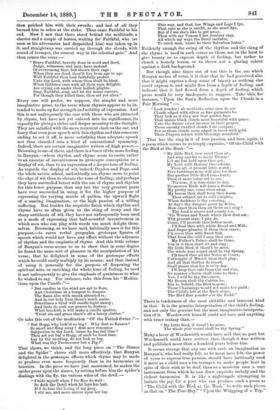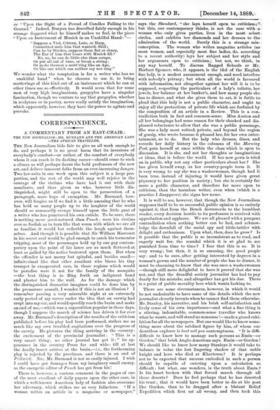BUNYAN'S USE OF VERSE.
ADISCOVERY of the original edition,—the edition of 1686,—of Bunyan's "Book for Boys and Girls; or, Country Rhymes for Children," which has just been re- published in fac-simile by Mr. Elliot Stock, has recalled atten- tion to his verse, of which there is plenty (usually of a rather poor quality) scattered through his great allegory. As a rule, when the pilgrims in "The Pilgrim's Progress" break out into verse, they more frequently than not flatten down what had been far more effectively and imaginatively said in prose. For example, take the death of Faithful in Vanity Fair. Here is the story of it in prose :—" They therefore brought him out to do with him according to their law ; and first they scourged him, then they buffeted him, then they lanced his flesh with knives ; after that they stoned him with stones,
then pricked him with their swords ; and last of all they burned him to ashes at the stake. Thus came Faithful to his end. Now I saw that there stood behind the multitude, a chariot and a couple of horses, waiting for Faithful, who (so soon as his adversaries had despatched him) was taken up in it, and straightway was carried up through the clouds, with -sound of trumpet, the nearest way to the celestial gate." And then comes the verse :-
"Brave Faithful, bravely done in word and deed, Judge, witnesses, and jury, have instead Of overcoming thee, but shown their rage : When they are dead, thou'lt live from age to age. Well Faithful thou halt faithfully profest Unto thy Lord, with whom thou shalt be blest When faithless ones with all their vain delights Are crying out under their hellish plights. Sing, Faithful, sing, and let thy name survive, For though they killed thee, thou art yet alive."
Every one will prefer, we suppose, the simpler and more imaginative prose, to the verse whose rhymes appear to be in- tended to make up for strength and nobility of expression. And this is not unfrequently the case with those who are attracted
by rhyme, but have not yet entered into its significance, its capacityfor giving a richer and deeper meaning to the thought. They are satisfied with the mere recurrent clash on the ear, and fancy that even poor speech with this rhythm and this sonorous -ending to set it off, is more satisfying than adequate speech not thus chiselled into a kind of conventional symmetry. Indeed, there are certain imaginative writers of high power,— Browning is one of these, and there is a trace of the same feeling in Bunyan,—whom rhythm and rhyme seem to excite rather -to an exercise of inventiveness in grotesque conceptions or a display of wit, than to an expression of a deeper tone of feeling. As regards the display of wit, indeed, Dryden and Pope, and the whole satiric school, undoubtedly use rhyme more to point the edge of wit than to elevate the tone of feeling; and perhaps they have succeeded better with the use of rhyme and rhythm for this lower purpose, than any but the very greatest poets have ever succeeded in using it for the higher purpose of expressing the varying moods of pathos, the upward flight -of a soaring imagination, or the high passion of a willing ,suffering. But besides the exquisite finish which rhythm and rhyme have so often given to the sting of irony and the -sharp antithesis of wit, they have not unfrequently been used as a mode of expressing that half-scornful inventiveness in -which men who can play with words too much delight them- selves. Browning, as we have said, habitually uses it for this ,purpose,—to carve verbal gurgoyles, grotesque figures of speech which would not have any effect without the adjuncts -of rhythm and the emphasis of rhyme. And this little volume
of Bunyan's.verse seems to us to show that in some degree he found the same sort of pleasure in the manipulation of his -verse ; that he delighted in some of the grotesque effects which he could easily multiply by its means; and that, instead -of using it generally for the purpose of deepening the -spiritual note, or enriching the whole tone of feeling, he used it not nnfrequently to give the emphasis of quaintness to what lie wished to say. For instance, take this from his " Medita- -lions upon the Candle :"—
" But candles in the wind are apt to flare,
And Christians in a tempest to despair.
The flame also with smoak attended is ; And in our holy lives there's much amiss.
Sometimes a thief will candle-light annoy ; And lusts do seek our graces to destroy.
What brackish is will make a candle sputter,
'Twat sin and grace there's oft a heavy clutter."
'-Or take this out of the meditation " Of the Fatted Swine :"— " But Hogg, why look'st so big F Why dost so flounce ? So snort and fling away ? dost now renounce Subjection to thy Lord, 'cause he has fed thee ? Thou art yet but a Hogg, of such he bred thee. Lay by thy snorting, do not look so big,
What was thy Predecessor but a Pig ?"
That shows, we think, and the long piece on " The Sinner
and the Spider " shows still more effectively, that Bunyan delighted in the grotesque effects which rhyme may be made 'to produce even more frequently than in its harmonies or beauties. In the piece we have just mentioned, he makes the spider press upon the sinner, by setting before him the spider's dealings with the fly, the various wiles of the devil :—
" I hide myself when I for flies do wait : So doth the Devil when he lays his bait,
If I do fear the losing of my prey, I stir me, and more snares upon her lay. This way, and that, her Wings and Legs I tye, That sure as she is catcht, so she must dye. But if I see she's like to get away, Then with my Venom I her Journey stay, All which my ways the Devil imitates,
To catch men, 'cause he their Salvation hates."
Evidently enough the swing of the rhythm and the clang of the rhyme is used in such verses as these, not in the least to give beauty or to express depth of feeling, but rather to clench a homely lesson, or to throw out a glaring colour against a dark background.
Bat though nine times out of ten this is the use which Bunyan makes of verse, it is clear that he had perceived also that it might express a deep sense of beauty as nothing else could express it, and might flow from a depth of feeling, and indicate that it had flowed from a depth of feeling, which prose would be very inadequate to suggest. Take this, for instance, " Upon the Sun's Reflection upon the Clouds in a Fair Morning "
"Look yonder ! ah methinks mine eyes do see Clouds edged with silver as fine garments be. They look as if they saw that golden face That makes black clouds most beautiful with grace. Unto the Saints sweet incense in their prayer, These smoaky curdled clouds I do compare : For as these clouds seem edged or laced with gold, Their Prayers return with blessings manifold."
That has the ring in it of true passion, and here, again, is a poem which seems to us simply exquisite, " Of the Child with the Bird at the Bush : "— " My little Bird, how cant thou sit;
And sing amidst so many Thorns !
Let me but hold upon thee get ; My Love with Honour thee adorns.
Thou art at present little worth ; Five farthings none will give for thee.
But prethee little Bird come forth, Thou of more value art to me.
'Tie true, it is Sun-shine to day, To-morrow Birds will have a Storm ; My pretty one, come thou away, My bosom then shall keep thee warm.
Thou subject art to cold o'nights, When darkness is thy covering, At day's thy dangers great by Kites, How moist thou than sit there ant sing ?
Thy food is scarce and scanty too, 'Tis Worms and Trash which thou dost eat ; Thy present state I pity do, Come, I'll provide thee better meat.
I'll feed thee with white Bread and Milk, And Suger-plumbs, if them thou crave ; I'll cover thee with finest Silk, That from the cold I may thee save.
My Father's Palace shall be thine, Yea in it thou shalt sit and sing; My little Bird, if thoul't be mine, The whole year round shall be thy Spring.
I'll teach thee all the Notes at Court; Unthought of Musick thou shalt play; And all that thither do resort, Shall praise thee for it ev'ry day.
I'll keep thee safe from Cat and Cur, No manner o'harm shall come to thee ; Yea, I will be thy Succourer, My Bosom shall thy Cabbin be.
But lo, behold, the Bird is gone ; These Charmings would not make her yield : The Child's left at the Bush alone,
The Bird flies yonder o'er the Field."
There is tenderness of the moat childlike and innocent kind in that. It is the genuine interpretation of the child's feeling, and not only the genuine but the most imaginative interpreta- tion of it. Wordsworth himself could not have said anything with truer ecstasy than,-
" My little Bird, if thoul't be mine,
The whole year round shall be thy Spring."
Many a lover of Wordsworth would have said that no poet but Wordsworth could have written that, though it was written and published more than a hundred years before him.
It seems strange that any one with such an imagination as Bunyan's, who had really felt, as he must have felt, the power of verse to express true passion, should have habitually used it more as a child uses a tin trumpet, to make people hear in spite of their wish to be deaf, than as a musician uses a rare instrument from which he can draw exquisite melody and the richest harmonies. It is like a nightingale attempting to imitate the jay, for a poet who can produce such a poem as "The Child with the Bird at the Bush" to write such pieces as that on " The Post-Boy," " Upon the Whipping of a Top,"
or "Upon the Sight of a Bound of. Candles Falling to the Ground." Indeed, Bunyan has .described fairly enough in his strange doggerel what he himself makes ne feel, in the piece " Upon an Instrument of Musick in. an Unskilful Hand:"—
"Suppose a Viol, Cittern, Lute, or Harp, Committed unto him that wanteth Skill;
Can he by Strokes, suppose them flat or sharp, The Ear of him that hears with Musick fill ? No, no, he can do little else than scrape, Or put all out of tune, or break a string : Or make thereon a mutt'ring like an Ape,
Or like one which can neither say nor sing."
We wonder what the temptation is for a writer who has no unskilful band" when he chooses to use it, to bring mutterings of this kind out of an instrument which he can at other times use so effectively. It would seem that for some men of very high imaginations, gargoyles have a singular fascination, though we venture to say that gurgoyles, whether in sculpture or in poetry, never really satisfy the imagination, which apparently, however, they have the power to agitate and provoke.












































 Previous page
Previous page